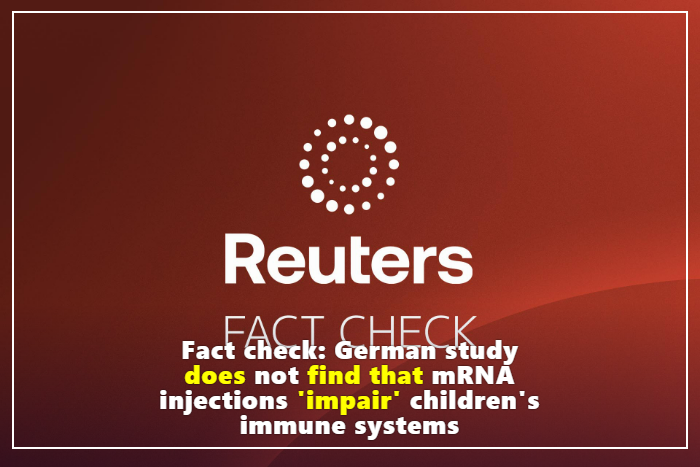A German study published in July 2024 did not find that the mRNA COVID-19 vaccine harms children’s immune systems, contrary to a post shared online that suggested it found an IgG4-related illness that was indicative of an immune disorder not related to the vaccine.
A post on Instagram shows a screenshot of an August 20, 2024 article on the People’s Voice website , which reads in part: “Pfizer’s mRNA COVID-19 vaccine affects children’s immune systems, including antibodies produced by the vaccine” using an experimental lens” and then links it to the disease without evidence.
However, vaccines do not contain antibodies . Antibodies are proteins produced by the immune system in response to a vaccine or infection that protect the body from foreign substances.
The research, conducted by researchers at the Center for Infection Research in Hamburg, Germany, found that children, like adults, produce less inflammatory SARS-COV-2 virus antibodies, known as IgG4, after repeated exposure to the virus.
The study authors concluded that the mechanisms behind the body’s conversion to this form of antibody need to be better understood, but they did not suggest that it is harmful to children’s immune systems, and did not mention IgG4-related diseases.
The study’s lead author, Dr. Robin Corbett, did not respond to a request for comment.
IgG4 levels
Dr. Christopher Palma, an associate professor of medicine in the division of allergy, immunology and rheumatology at the University of Rochester, said the article distorts the study by Corbett and his colleagues.
The study also found an increase in spike-specific IgG4 levels in children after repeated vaccination, which is expected after any re-infection, vaccination, or a combination of both, Palma said in an email.
Dr. Brett Smith, a primary care physician specializing in rheumatology at Children’s Hospital of East Tennessee, said increases in IgG4 responses were first seen in adults and then, in this study, in children.
“The increase in IgG4 was greater than expected and greater than the increases seen with other vaccination technologies (non-mRNA vaccines),” Palma said. The clinical concern is that IgG4 antibodies are less functional in preventing or fighting viral infections.
“This is an important finding that requires further study, particularly with regard to the clinical efficacy of these vaccines in preventing severe disease from COVID-19 infection,” Palma said.
They noted that although spike-specific IgG4 levels increased in the children in the study, their spike IgG1 levels were 100 times higher than spike IgG4 levels and remained high, suggesting they still have plenty of helpful anti-spike antibodies that can protect them from severe COVID-19.
IgG4 related diseases
According to the Merck Manual, IgG4-related disease is an immune disorder in which IgG4-producing immune cells, along with other related cells, abnormally accumulate in certain organs and damage them. The disease primarily affects middle-aged and older men, but it can affect any age or gender, and its exact cause is unknown.
It’s a well-known but rare disease in the rheumatology community, Smith said.
“While total IgG4 levels are often elevated in patients with IgG4-related disease, many individuals without IgG4-related disease also have elevated total IgG4 levels, and many people with IgG4-related disease have elevated IgG4 levels,” Palma said in general.
“It’s very simple — elevated IgG4 levels do not equate to IgG4-related disease or risk of developing IgG4-related disease,” Palma said.
“As for the concern about IgG4-related disease – which is completely unfounded – it is not supported by the data from this study, the known pathophysiology of IgG-4-related disease, or the overwhelming amount of observational evidence over the past 4 years. Support.
Palma said the German study measured viral spike-specific antibodies, not total IgG4 levels.
“It is important to note that the relationship between IgG4-RD and vaccination is currently unclear,” Palma said. “There is no evidence that vaccination is associated with IgG-related disease.”
“The increase in IgG4 levels following mRNA vaccination may provide a regulatory function — helping to prevent excessive inflammation — and may be beneficial rather than harmful,” Palma said.
(Updated to remove duplicate words in title)
cataclysm
False. A German study looked at IgG4 levels in children after they received the mRNA COVID-19 vaccine and found no evidence that the vaccine harmed their immune systems or caused IgG4-related illness.
This article was written by the Askume fact-checking team. Learn more about our fact-checking efforts .
text_section_type=’notes’>This article was produced by the Askume fact-checking team. Learn more about our fact-checking of social media posts here .









